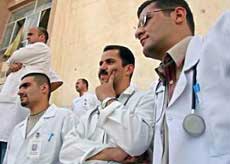Untitled Document
 |
Many doctors have left abroad
from unsafe Iraq. |
BAGHDAD, August 3, 2005 (IslamOnline.net) – It appears as if doctors have
become something of a rarity in occupied Iraq whose medical system has been left
in tatters since the US-led invasion and its ensuing violence.
Though hospitals are bursting at the seams with patients and people injured
in US raids or bloody indiscriminate bombings, doctors who have become increasingly
jittery over the deteriorating security conditions, are fleeing the scene.
“It is my dream now to get a job abroad. It is not safe any longer in
Iraq,” cardiologist Rabeh Al-Assal told IslamOnline.net Wednesday, August
3.
A July 20 survey by the British NGO Iraq Body Count found that the US-led occupation
forces in Iraq have caused 37 percent of civilian deaths – some 25,000
in just two years.
The survey further found that criminals and gangs came close second at 36 percent,
while resistance fighters accounted for 9.5 percent.
“It is a hopeless case, it will take Iraq at least 20 years to recover,”
added frustrated Assal.
Off-Limits
The unabated violence, which culminated Monday, August 1, in the grisly beheading
and killing of 20 Iraqis by unknown militants in southwest Baghdad, has made
hospitals and clinics off-limits to doctors after 07:00 pm.
Used to run round-the-clock shifts in the past to treat emergency cases, doctors
now have slashed their working hours to only six hours a day and sometimes to
just two.
“I nervously carried my son who was injured in his eye to a nearby clinic
and it was 7:30 pm, but no body answered the door,” Moaed Al-Amari, who
lives in the posh Al-Mansour district, told IOL.
Famed doctors in the country have cut it short and left the country for good.
Others opted for the tranquil north in cities like As- Sulaimaniyah (375km
from Baghdad).
“A friend of mine in As-Sulaimaniyah told me that clinics have been mushrooming
in the city over the past years thanks to security and stability,” said
Subhi, a shop owner.
Armed Doctors
The mayhem and insecurity forced some doctors to carry weapons to protect themselves
in a country where lawlessness and free-for-all looting have become part of
normal life.
“Criminals often target doctors for money or to punish them, particularly
surgeons, for failing to treat a relative,” said a Baghdad doctor who
requested anonymity.
Spokesman for the health ministry, Qasim Allawi, said the government has allowed
doctors and scientists to carry weapons to defend themselves.
He said an ad hoc ministerial committee has decided to set up special squads
to provide basic protection for them.
Allawi further said that police patrols will be deployed to protect some 40
clinics and medical centers in Baghdad.
The ministry launched last month a nationwide media campaign to sound the alarms
over the doctor killings phenomenon.
British medical charity Medact has warned that the health of the Iraqi people
has deteriorated since the 2003 invasion.
It said one in four people in Iraq still depends on food aid and more children
are underweight or chronically malnourished than in 2000.

